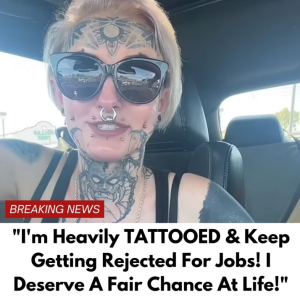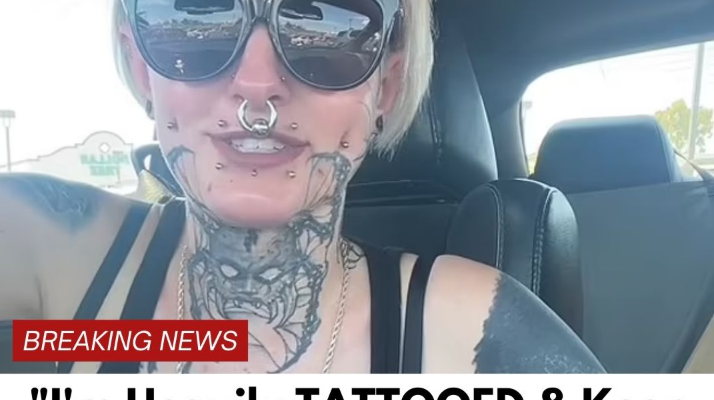
“I’m Heavily TATTOOED & Keep Getting Rejected For Jobs! I Deserve A Fair Chance At Life!”
For many people, tattoos are simply art—expressions of identity, culture, or personal journeys etched onto the skin. But for others, those same marks can become barriers, quietly closing doors that should remain open. This is the story shared by countless individuals worldwide who feel judged not for their skills, character, or work ethic, but for the ink on their bodies. And at the center of that experience is one heavily tattooed person speaking out, saying what so many feel: “I deserve a fair chance at life.”
Tattoos have become more accepted over the past decade, with celebrities, athletes, and professionals openly displaying body art. Yet despite the cultural shift, workplace discrimination against visibly tattooed people remains surprisingly common. Many individuals who proudly wear their ink still face an uphill battle when applying for jobs, especially in customer-facing roles or industries that cling tightly to conservative standards of appearance. And for someone heavily tattooed—sleeves, neck, hands, face—the challenge becomes even greater.
In this personal account, the speaker describes the repeated cycle of rejection. They go into interviews confident, prepared, and qualified. They arrive with experience, strong references, and a genuine desire to work hard. But as soon as they walk in, they see the change in expression. The interviewer’s smile tightens. Their eyes flicker to the tattoos, lingering too long. The tone shifts. Questions become shorter. The atmosphere grows colder. And before the candidate even finishes talking, they already know: this job is gone.
“It’s not that they say it outright,” the speaker explains. “They don’t say, ‘We won’t hire you because of how you look.’ They just tell me that they’ve chosen another candidate—someone who ‘better fits the company image.’ But we all know what that really means.”
For them, the frustration is not simply about losing opportunities—it’s about being denied the chance to prove themselves. They aren’t asking for special treatment, just the same consideration as anyone else who applies. Their tattoos do not affect their ability to perform tasks, communicate with customers, or uphold professional standards. Yet employers often assume tattoos represent irresponsibility, rebellion, or poor judgment. These stereotypes, rooted in outdated perceptions, create a system where a person’s appearance outweighs their abilities.
The speaker points out that tattoos are not a measure of professionalism. Many tattooed individuals are nurses, teachers, entrepreneurs, managers, and skilled workers. Tattoos are art, not a behavioral prediction. They don’t diminish reliability, intelligence, or morality. And in many cases, tattoos have deep personal meaning—marking the stories of hardship, growth, cultural identity, or survival.
But despite the progress society has made, workplaces don’t always reflect that evolution. Some companies hide behind the phrase “professional image” to maintain appearance-based discrimination. Others rely on unspoken biases. And the reality is that heavily tattooed people often have to work twice as hard just to be seen as equal.
The emotional toll of repeated rejection is heavy. “Every time I get turned down,” they say, “it chips away at my confidence. I start to wonder if I’ll ever get the chance to build a stable life. I want to work. I want to contribute. I want stability. But how am I supposed to do that if I’m judged before I even open my mouth?”
Their story is far from unique. Many people with visible tattoos share similar experiences. Some resort to wearing long sleeves year-round, even in scorching temperatures, to hide their ink during interviews. Others feel forced to change careers entirely, choosing paths where tattoos are more acceptable or at least less noticed. A few even undergo painful tattoo removal—not because they regret their art, but because society refuses to see past it.
Yet the speaker feels strongly that this shouldn’t be necessary. Tattoos are a part of who they are, a representation of their individuality, not a barrier to their success. And they argue that companies lose valuable talent when they judge applicants by appearance rather than ability. “People say tattoos make me unemployable,” they explain. “But what makes me unemployable? The ink on my skin— or the closed minds of the people judging me?”
They call for fairness—true fairness, based on skill, personality, and work ethic. They want companies to update their standards, to look at the world as it is today, not as it was decades ago. Many of the most innovative, creative, and hardworking people have tattoos. Some of the world’s greatest artists, inventors, and entrepreneurs expressed themselves through their bodies as well as their work. To dismiss someone for their ink is to overlook potential—and to participate in discrimination that has no place in an evolving society.
They also emphasize that diversity isn’t just about race, gender, or age. It includes appearance, self-expression, and individuality. Employers who embrace these differences often benefit from more inclusive, motivated workplaces. Customers, too, have become far more accepting—many even prefer interacting with authentically expressive employees rather than those forced to hide their identity.
The speaker urges companies to reevaluate outdated dress codes and reconsider what professionalism truly means. Professionalism is behavior—punctuality, communication, dedication, reliability—not an absence of tattoos. In fact, professionalism thrives when people feel comfortable being themselves. And when individuals are allowed to express their identity without fear of discrimination, they bring more passion, creativity, and commitment to their roles.
But beyond workplace policies, this story is also a plea for empathy. “You don’t know my story,” they say. “You don’t know what my tattoos mean. You don’t know what I’ve lived through, survived, or overcome. Don’t judge me because I use my skin as a canvas. Get to know me. Let me show you who I am.”
Ultimately, their message is simple: everyone deserves a fair chance at life. Everyone deserves the opportunity to work, to earn a living, to build their future, and to be evaluated on their merits. Appearance alone should never be the deciding factor between success and struggle.
In a world that claims to value equality, individuality, and self-expression, heavy tattooing should not be a barrier to employment. It is time to challenge outdated assumptions. It is time to recognize that tattoos do not define character. And it is time to treat people with the fairness and respect they deserve.
“I’m not asking anyone to love my tattoos,” they conclude. “Just see past them. Give me a chance. Give people like me a chance. That’s all I’m asking.”


